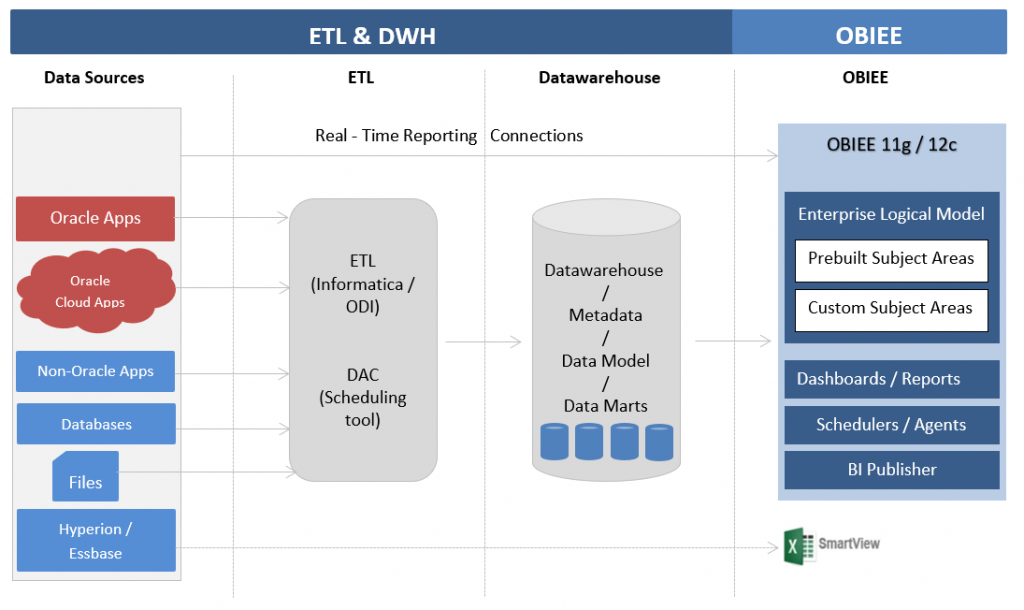Oracle Business Intelligence Applications provide a set of pre-defined reports, helping organizations to analyze the past & present organizational performance trends, and take corrective actions.
In this blog, we are going to understand how to automate the OBIEE Catalog extraction to a Microsoft excel spreadsheet by maintaining the integrity of the system. This will help us to identify the number of folders, subfolders, dashboards and permissions set for folders & dashboards.
Before taking a look at the scripts to extract, let’s talk about the fundamentals of Oracle BI Apps.
Introduction to Oracle BI Apps
Oracle Business Intelligence Applications provide real-time enterprise-wide insights for everyone in an organization, enabling fact-based actions and intelligent interaction.
Designed for rapid deployment at a low cost of ownership, Oracle Business Intelligence Apps provide complete, prebuilt BI solutions empowering users at all levels in an organization. It takes hold of existing corporate data source and seamlessly integrates with Oracle’s transactional solutions thereby maximizing effectiveness across the entire customer life cycle.

Oracle BI includes Oracle fusion cloud and on-premises applications. For rapid development and good built-in practice, organizations are using packaged BI applications.
BI Apps consist of one ETL tool (Informatica or ODI), one reporting tool (OBIEE), and one centralized Datawarehouse (Oracle).
When we install BI Apps, pre-built OBIEE reports are available for the organization for business modules such as Finance, HRMS, Manufacturing, SCM, Procurement, etc.
OBIEE Key Features
Popularly known as Oracle Business Intelligence Enterprise Edition, below are some of its key features:
Built-in & Customizable Analytic Capabilities: OBIEE Applications consist of built-in functionalities that are extensible to enterprise needs.
Unified Semantic View: OBIEE models complex business information and modes from various sources to a common enterprise logical model.
End-user Self-service: Using OBIEE, business users can develop ad-hoc analytic reports based on their needs.
Open Scalable Architecture: OBIEE’s architecture helps it to scale vertically and horizontally in any tier.
Integrating Multiple Analytic Applications: OBIEE has the foundation for integrating multiple applications like Finance, procurement, HR, Transportation, etc.
Steps to Extract OBIEE Catalog
1.Login to the Oracle BI Analytics Server Linux MT Box with Admin privileges.
2. Navigate to the path of “catalogmanager” and check for “runcat.sh” file. This script is predefined, which helps to extract the Catalog objects to the file. Below is the screenshot.

3. Now prepare the shell script named “catalog_extract.sh” which helps to extract the dashboard and folder details to an Excel spreadsheet. This script can be scheduled to extract the catalog through Cron job.

4. The catalog extract script contains two runcat.sh commands, the location, and name of file. Provide the credentials in the script using file, here it is named as dev_login_Details.txt. This stores the credentials to execute Catalog Extract script.
5. The two runcat.sh commands in the file are to obtain the folder & dashboard from the server and to export these two files to the target location.
Cron Job Setup for Automated Process:
A Cron job can be setup to run the extract script automatically every day at 07:00 PM EST to the specified target location. Below is the script.

This blog provides high-level overview of the fundamentals of Oracle BI applications, some of its unique features, and steps to extract OBIEE data to excel file.
Evoke’s Oracle ERP Services
Evoke Technologies is an IT leader with over 15 years of experience in delivering software solutions to global enterprises. Our highly trained and experienced software engineers customize, implement, test, maintain and upgrade all your Oracle products, positioning you for maximum success. To know more about Evoke’s Oracle Services, please contact our sales team at +1 (937) 660-4923 or email us at sales@evoketechnologies.com or visit our website.
Author
 |
Venkata Dinesh works as a Technical Associate at Evoke Technologies and has assisted his team in delivering several BI projects. He likes to spend his leisure time exploring emerging technologies and playing sports. |






